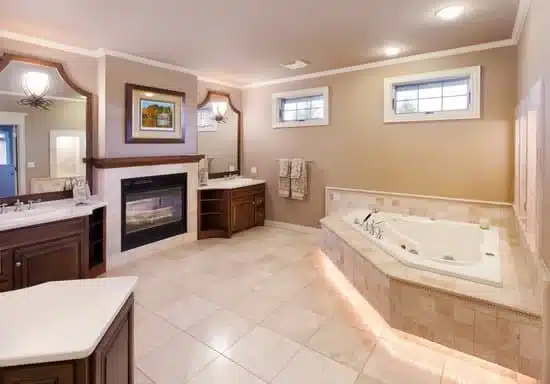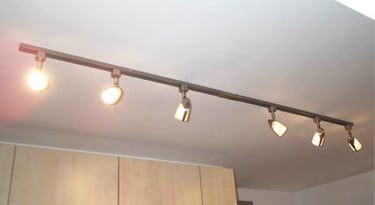Track AND ACCENT lighting
Discover the Magic of Track and Accent Lighting
Lighting has a powerful influence on the feel and functionality of your home. Whether you’re trying to create a cozy ambiance or draw attention to your home’s best features, the right lighting makes all the difference. That’s where track and accent lighting come into play. These lighting solutions go beyond basic illumination—they bring personality, efficiency, and elegance to your spaces.
Expert Electric specializes in designing and installing custom lighting systems, helping homeowners across British Columbia enjoy modern, stylish, and energy-efficient lighting solutions.

What is Track and Accent Lighting?
Track lighting is a versatile system where multiple light fixtures are mounted on a continuous track. This setup allows homeowners to adjust light directions easily and focus lighting wherever it’s needed. Whether you’re showcasing a beautiful painting, lighting up kitchen counters, or adding vibrance to your hallway, track lights offer that flexibility.
Accent lighting, on the other hand, is all about highlighting specific architectural or design features. Think of it as mood lighting—it’s what gives your space depth and charm. From bookshelves to sculptures to textured walls, accent lighting draws attention and creates dimension.
Together, these lighting types enhance aesthetics and functionality, making your home more livable and visually appealing.
Why Choose Expert Electric for Track and Accent Lighting?
1. Personalized Design Consultations
Expert Electric doesn’t believe in one-size-fits-all. Each home is unique, and so is its lighting requirement. Our design consultations focus on tailoring the lighting plan to suit your preferences, room dimensions, and intended purpose.
2. Professional Installation
Poorly installed lighting can cause inconvenience, safety risks, and higher utility costs. Our certified electricians ensure safe, efficient installations, minimizing disruptions and maximizing results.
3. Energy-Efficient Options
We offer a wide range of LED-compatible track lights that are not only brighter and cooler but also reduce your electricity bills significantly over time.
4. Superior Materials & Brands
We work with top lighting manufacturers to ensure durability, quality, and design excellence. From sleek modern rails to vintage-inspired fixtures, you get it all under one roof.
Best Rooms to Install Track and Accent Lighting
Living Room:
Perfect for spotlighting artworks, architectural details, or creating ambient zones. Directional track lighting helps reduce shadowing while enhancing décor.
Kitchen:
Install under-cabinet accent lights and track lighting over islands for both practical and aesthetic appeal. These make food prep areas safer and visually appealing.
Hallways and Entryways:
Use accent lights to emphasize textures or feature walls. It not only guides guests but also enhances first impressions.
Bathrooms:
Layered accent lighting adds a spa-like touch, while track lights provide functional lighting over mirrors or sinks.
Bedrooms:
Soft accent lighting around headboards or reading corners helps create a serene environment, while directional track lights can be used for wardrobes or vanities.
Maintenance Tips for Track and Accent Lighting
- Dust Fixtures Regularly to prevent buildup that may reduce brightness.
- Check for Loose Bulbs or Wiring every few months to maintain safety.
- Use Compatible Bulbs—particularly if switching to LEDs.
- Update Dimmers if you’ve recently installed LEDs, as not all older dimmers are compatible.
With proper care, your lighting system can last for years while retaining its efficiency and charm.
FAQs
Q: What is the difference between track and accent lighting?
A: Track lighting involves multiple adjustable fixtures on a single rail, useful for general and task lighting. Accent lighting focuses on highlighting specific objects or areas to create visual interest.
Q: Can track and accent lighting be installed in older homes?
A: Yes. With proper assessment, track and accent lighting systems can be retrofitted into older homes, especially using surface-mounted tracks that don’t require major ceiling modifications.
Q: Are LED lights compatible with most track systems?
A: Yes, most modern track systems are compatible with LED bulbs, which are energy-efficient, cool to the touch, and long-lasting.
Q: How customizable are track lighting systems?
A: Very! You can choose fixture shapes, finishes, bulb types, color temperatures, and the direction of each light head.
Q: How long does installation take?
A: Typical installations can take a few hours, depending on the complexity and existing electrical infrastructure. Expert Electric ensures a smooth and quick setup.
Final Thought
Lighting isn’t just about visibility—it’s about atmosphere, focus, and energy. With Expert Electric’s customized track and accent lighting solutions, you can illuminate your spaces beautifully and efficiently. From cozy reading nooks to statement hallway pieces, every corner of your home deserves to shine.
Whether you’re renovating, building new, or simply looking to upgrade your home’s vibe, Expert Electric provides professional expertise and creative lighting solutions that add value and comfort.

